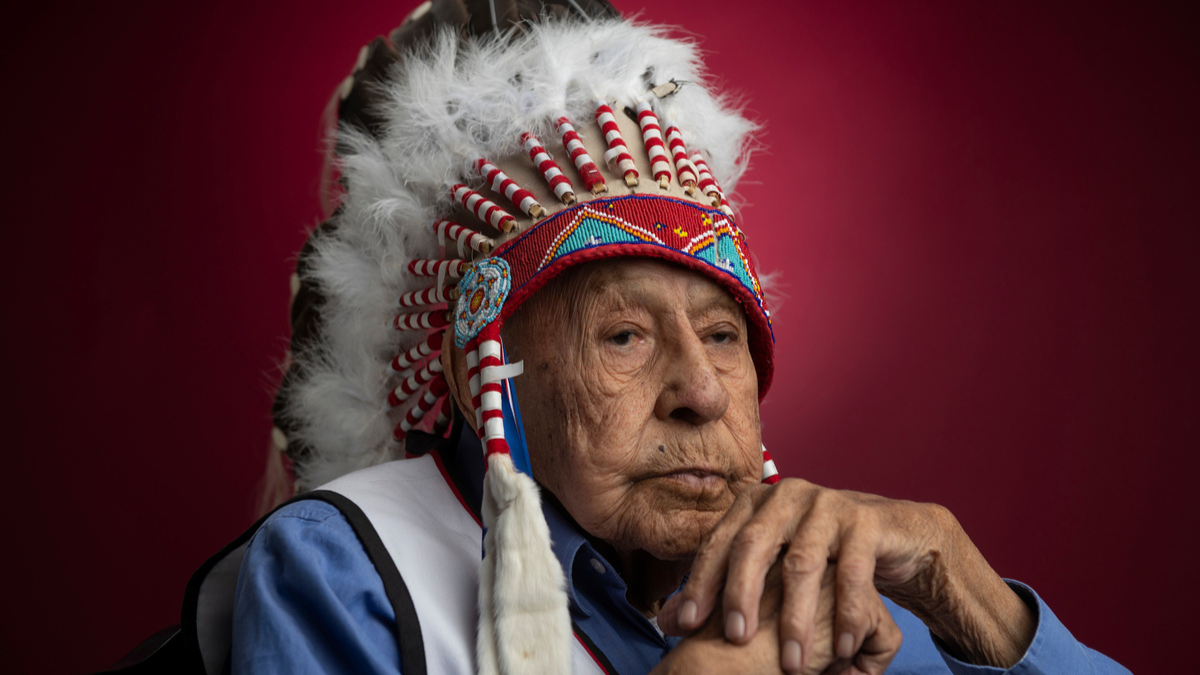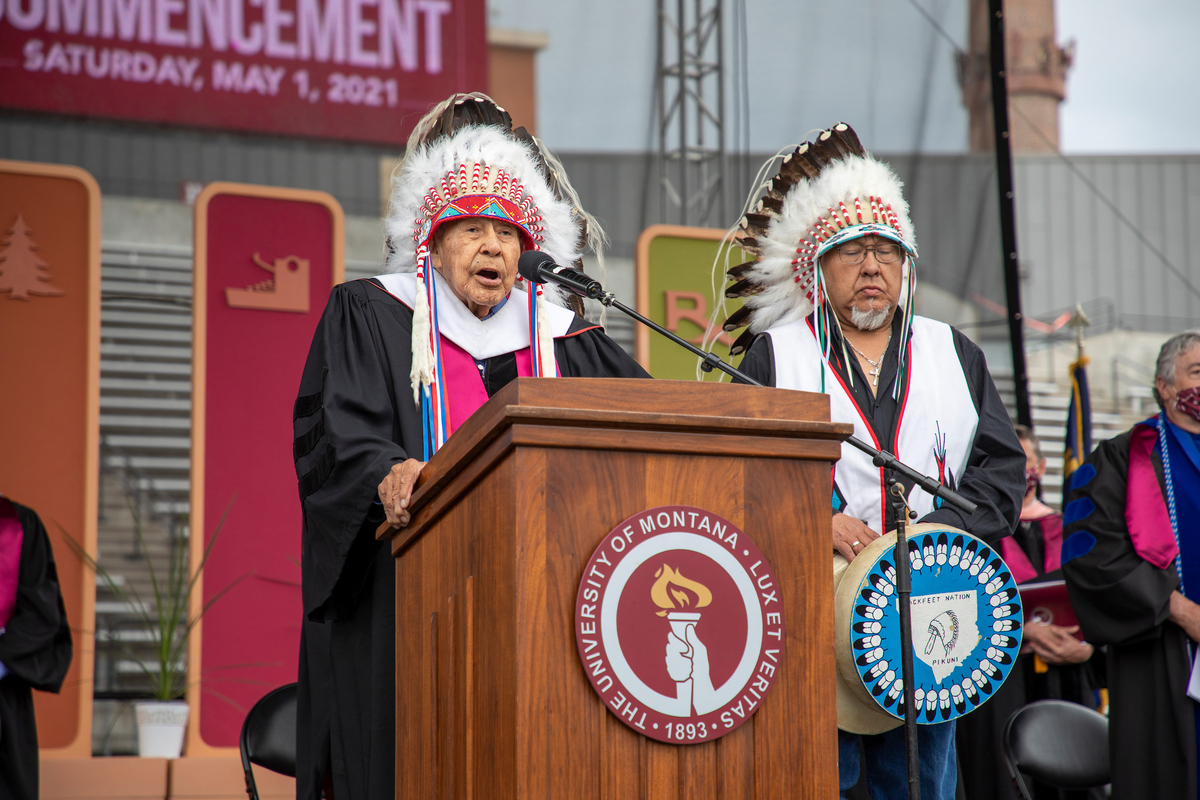
- Details
- By JoVonne Wagner
It has been about a year and a half since Earl Old Person, the Blackfeet chief, passed away at age 92 from cancer. The tribal leader, politician, and language holder left behind a lifetime legacy that beckoned for recognition from Montana leaders.
This story was originally co-published by Montana Free Press and ICT.
Montana lawmakers seem to have recognized Old Person’s legacy. Though it took some work, the Legislature passed a bill to rename a section of Montana Highway 89 on the Blackfeet Reservation after the late Blackfeet chief. The bill is currently on Gov. Greg Gianforte’s desk awaiting his signature, which would make the name change legally official.
Bill sponsor Sen. Susan Webber, D-Browning, said the motivation behind the measure came from the community Old Person served.
“It’s an honor to be asked by your tribe to do something for them, and so that implies that, you know, 17,000-plus members of the Blackfeet tribe had requested that,” Webber said.
Webber believed Senate Bill 120, first introduced in January, would pass quickly. In fact it got tabled in the Senate Highways and Transportation Committee.
“It was a struggle getting it out and, and it shouldn’t have been,” Webber said. “It should have been a slam dunk. It should have been easy, and I thought when I started it out, ‘Oh, it’s just going to sail through.’ That wasn’t the case.”
Members of the committee spoke during the bill’s first reading and suggested that renaming highways is reserved for fallen soldiers and police officers. Sen. Barry Usher, R-Laurel, a former state representative, called for the motion to table the bill. Usher said it has been customary to name highways after fallen military personnel and law enforcement officers.
“In the House Transportation [committee] we had a lot of these bills, and in the House we came to the conclusion that we would only pass if someone died in the line of duty in the military or law enforcement, and that’s because we ended up with 10s, maybe 20 or more of these,” Usher said in committee. “There are many, many, many other ways to significantly recognize the great service to our state and our country for people.”
Despite the bill’s rough initial reception, Webber said, it was blasted onto the Senate floor Jan. 13 in a last-chance effort to keep it alive. The motion passed, and the Senate pushed it through on a 36-14 vote Feb. 16.
The Montana American Indian Caucus presented a letter of support to the House Transportation Committee after the bill passed the Senate floor.
“Chief Old Person was also a staunch Republican politically but most importantly, stood up for Native American Rights creating precedent for all Indian Country,” the caucus letter said. “This committee can recognize one of our most historic Montanans and Native American Chiefs.”
Old Person represented the Blackfeet tribe politically for 70 years, sitting on the Blackfeet Tribal Business Council for the majority of that time. His influence reached far and wide and he was known for his work with both reservation and off-reservation governments.
Rep. Tyson Running Wolf, D-Browning, carried Webber’s bill onto the House floor last week when it was up for second reading. Running Wolf served alongside Old Person on the Blackfeet Tribal Business Council in recent years.
“Chief Earl Old Person positioned himself as a go-between, linking his Native American community with the rest of the country and beyond,” Running Wolf said in his opening statement on the floor. “He urged his tribe to be more entrepreneurial and he pressured government officials and venture capitalists to invest in Blackfeet-owned businesses.”
Old Person had a strong and consistent involvement with the country’s political leaders. Running Wolf said the chief met with every U.S president from Harry S. Truman through Barack Obama, making sure that Indian Country was recognized and had a voice.
Running Wolf closed the floor discussion with a quote from the late chief.
“He would say, ‘Thank you all my relatives, I’m really happy to be here with you. Try really hard and do your best for the people you serve,” Running Wolf said.
Often described as kind and welcoming, Old Person touched the lives of many Montanans, including lawmakers in the state House of Representatives.
Rep. Michele Binkley, R-Hamilton, also spoke to the House. She told fellow lawmakers of a time when Old Person had given her money to help her move to Florida. Years later, she still remembered his generosity.
“I just can’t say enough about him. I just really loved him,” Binkley said.
Old Person encouraged the pursuit of education for Native youth and understood the power of continued learning. The University of Montana awarded him an Honorary Doctorate in Humane Letters in 1994 in recognition of his humanitarian accomplishments.
 Blackfeet Chief Earl Old Person addresses UM’s class of 2021 at the Spring Commencement ceremony. Credit: Andy Kemmis / University of Montana
Blackfeet Chief Earl Old Person addresses UM’s class of 2021 at the Spring Commencement ceremony. Credit: Andy Kemmis / University of Montana
University Of Montana President Seth Bodnar told Montana Free press the university had a long-time relationship with Old Person. The chief was a part of the Rawhide Singers, a group from the Blackfeet Tribe that honored each graduating class at UM through song.
“Just demonstrating the important role that Native American heritage and culture plays, not just in this university’s past, but in our present and the important role that it plays in our future,” Bodnar said. “Chief Old Person was an incredible leader. He was a role model for so many people, including myself.”
Last year the university set up a $300,000 endowment in Old Person’s name that goes to help produce the school’s annual Kyiyo Pow Wow.
“I learned a great deal just in my time visiting with him and watching him interact with people. He truly cared for people and embodied the idea of a servant leader for so many,” Bodnar said.
When Old Person died, the Blackfeet community lost not just its chief, but an iconic holder of its culture and language.
“When he was a teenager, he was an interpreter for the tribal council, which was made up of people who spoke the language,” said John Murray, the Tribal Historic Preservation Office director for the tribe. “They had connections back to, you know, the old life, of the Blackfoot way.”
In an interview with MTFP, Murray spoke about the chief’s interconnectedness with families in the community, saying Old Person had ties either directly or indirectly to every family. Murray said the chief lived through many milestones of historical significance to Native Americans, including the passage of federal laws including the Indian Civil Rights Act and the Indian Freedom Act. Old Person also served as president of the National Congress of American Indians in 1969 and 1970.
“He was one of the icons of Indian Country leadership,” Murray said.
The two-mile segment of Highway 89 to be memorialized in Old Person’s honor is located on the Blackfeet Reservation west of Browning and stretches toward Browning High School — a strategic choice.
Webber said she asked the chief’s family where they wanted the road to be. The family asked that it pass in front of the school.
“We want to basically show our Native children and our guests that we have these outstanding people in our communities, and it’ll give them a sense of pride, it’ll give them a sense of, ‘Yes, I can do this,’” Webber said.
Author Bio: JoVonne Wagner is a member of the Blackfeet Nation located in Northwestern Montana. She was born and raised on the reservation, where she says she experienced and lived through all the amazing things about her home, but also witnessed all the negative aspects of rez life. Wagner is an alumni of NPR'S Next Generation Radio. JoVonne interned for Buffalo's Fire and she recently graduated from the University of Montana School of Journalism.
Help us defend tribal sovereignty.
At Native News Online, our mission is rooted in telling the stories that strengthen sovereignty and uplift Indigenous voices — not just at year’s end, but every single day.
Because of your generosity last year, we were able to keep our reporters on the ground in tribal communities, at national gatherings and in the halls of Congress — covering the issues that matter most to Indian Country: sovereignty, culture, education, health and economic opportunity.
That support sustained us through a tough year in 2025. Now, as we look to the year ahead, we need your help right now to ensure warrior journalism remains strong — reporting that defends tribal sovereignty, amplifies Native truth, and holds power accountable.
 The stakes couldn't be higher. Your support keeps Native voices heard, Native stories told and Native sovereignty defended.
The stakes couldn't be higher. Your support keeps Native voices heard, Native stories told and Native sovereignty defended.
Stand with Warrior Journalism today.
Levi Rickert (Potawatomi), Editor & Publisher
